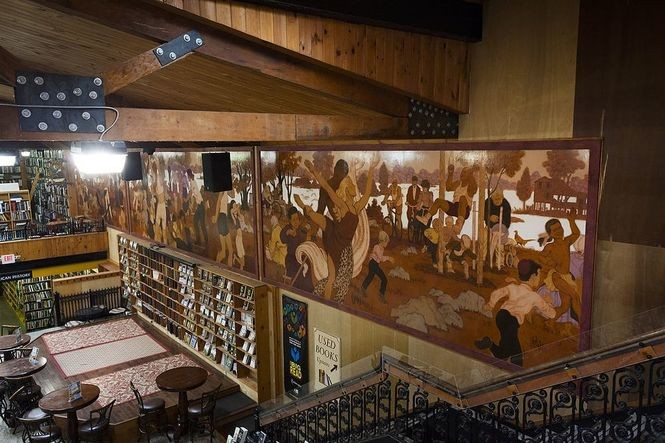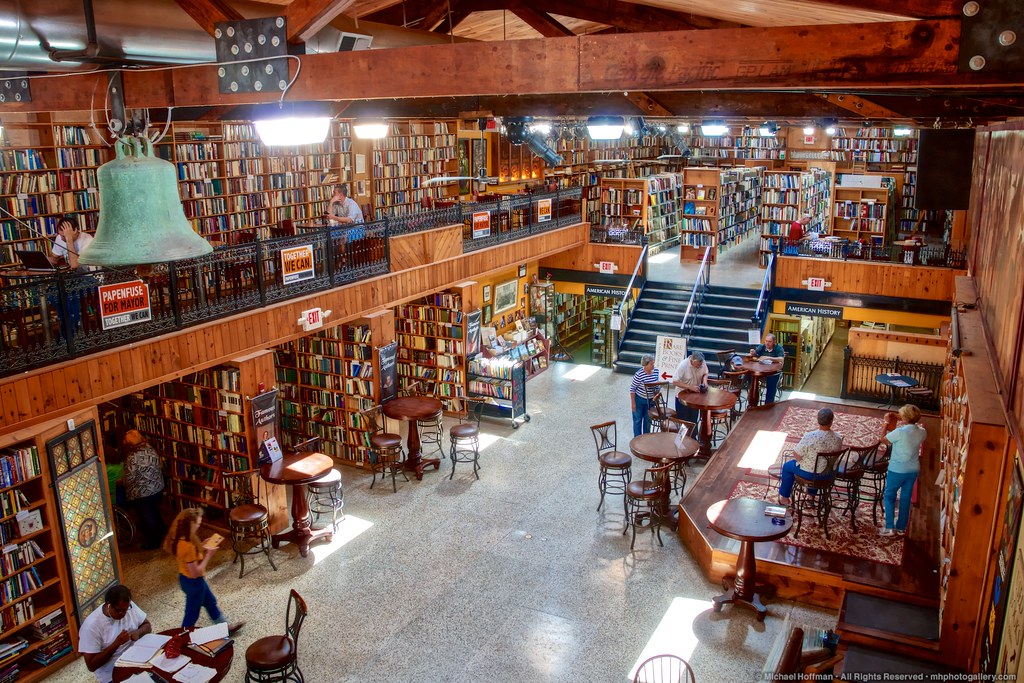Rich Intentions & a Love of Books: The History of Midtown Scholar Bookstore
When Midtown Scholar’s owners, Eric Papenfuse and Catherine Lawrence, met, they bonded over their shared love of books. Who would have known that over 20 years later, they would own one of the best indie bookstores in the country?
Papenfuse and Lawrence had already married each other when they decided to begin selling used books online in 1999. The official establishment of Midtown Scholar came two years later in 2001, when their niche was solidified in scholarly and academic books. However, the bookstore would not have a public, in-person location until 2003, when the doors of the old midtown post office were opened once again, this time with books lining the shelves. The Scholar was moved into the 1920s theater turned furniture store on the corner of 3rd Street and Verbeke Street in 2007 after extensive renovations on the building.
In April of 2023, Midtown Scholar held an interview with the owners about the origins of the store, and what it means to them. Something fascinating about the time Midtown Scholar came about as online bookselling is that it is the same period that Amazon began to show up as an online bookselling service. When asked about whether they found this worrying in the beginning, the co-owners pointed out that Amazon’s existence was an assist to them in ways. They were able to watch Amazon to keep their fingers on the pulse of what was popular, what was hard to get, and what was not selling as well. They make a point to find what is hard to find or what may not have large quantities published within the academic and scholarly world, so they have whatever people need. Their academic catalog is considered the largest between New York City and Chicago (Cheney).
One of the ways the store is stocked is through the closing of other indie bookstores. Papenfuse and Lawrence have traveled the country buying the stocks of shops that are closing to stock their shelves. They find rare titles, collector’s editions, and whatever else they can within these sales, and it keeps the memories of the original stores tied to them and the Scholar. Now, Midtown Scholar houses over 200,000 titles in store and over 2 million titles online, new and used from a variety of genres, so their consumers can find whatever they need. They began the Harrisburg Book Festival in 2012 to circulate stock, and it has become so much larger in the years since.
One of the things Catherine Lawrence made a point of in the interview was the intentionality they put into every piece of the Scholar. The name, Midtown Scholar Bookstore, was an intentional choice by the two when they established their first location. Even though their new store was on the outskirts of midtown Harrisburg, the Midtown Cinema was already in place, and they took inspiration. Papenfuse and Lawrence wanted people who heard the name to believe the store could be a part of the midtown for any city in the country. The Harrisburg community is extremely integral to the Scholar, Eric Papenfuse even having served as mayor of the city from 2014-2022, but those who know nothing about the store and its culture could make assumptions off the name and look it up later. This would open them up more to a nationwide audience, especially alongside their niche in the scholarly and academic book realm as well.

It is key to note the store’s location within midtown Harrisburg because Harrisburg is the capital of Pennsylvania. This means that prominent people, especially politicians, are visiting the city. Back in 2016, while Hilary Clinton was on her campaign tour, Bill Clinton made a point to visit the Scholar, staying for about an hour, browsing books, talking about books, and buying books. Its placement between more major cities like NYC, Chicago, Philadelphia, and Pittsburgh also gives them a prime place for well-known authors to come and speak.
Because the Scholar will occasionally host more controversial figures in the hopes of allowing people exposure to ideas that may not be their own, there have been worries over the years of protests breaking out at their events. This has not been a concern brought to fruition, but it shows the points of both Archibald MacLeish in “A Free Man’s Books” and Jack Perry in his article, “Bookstores, Communist and Capitalist.” MacLeish points out the power of the written word displaying how it was one of the first things regulated and destroyed when power was being sought by the Nazi party. Perry shows this same notion with his exploration of how other nations have such difficulty getting their hands on books and when they do, those publications tend to be filled with propaganda. He wants people to realize the true worth of a good bookstore where ideas from any side can be shared and discussed because it is not that way worldwide. “I decided along the way that the importance, for me at least, of having a comfortable bookstore at hand with a wide and free choice of books could not be exaggerated… If we lose the individual, the eccentric, the out-of-the-way, from our world of books, we lose too much. All the first-rate writing and conscientious publishing in the world will not help us unless we have good bookstores to entice us to where the good books are,” (Perry p. 111).

One of the most well-known of the intentional pieces in the bookstore is the mural that wraps the inside walls of the main room of the building. Papenfuse and Lawrence commissioned the work from Steve Feaser, their neighbor and friend, for the outside of the original building. The old post office was an odd-looking place, and they wanted to make it beautiful and attract people. The mural is named “Life Along the River” and is a collection of the sketches Feaser did throughout his years in Harrisburg during his people watching expeditions along Front Street at the Susquehanna River. Papenfuse describes it as a “historical montage.” They explain that they were able to fit the mural inside the new building perfectly, to their surprise and joy, and they felt it would really emulate their goal of bringing the community together not just to buy books but to discuss them or to discuss anything they found worthy.
Midtown Scholar’s owners embedded into their store and its culture other ideals of MacLeish that he expressed in “A Free Man’s Books.” MacLeish said, “Books, in the last century and the century before, were sold by men who knew them not as packages but as books—men who had, and were entitled to have, opinions about the content and the value of the books they sold—men whose customers came to them, not to learn how many copies of a given novel had been sold before, but to talk about the novel itself—the innards of the novel—the quality of the book… True books are sold by the enthusiasm of those who know them and respect them. And that enthusiasm must express itself by word of mouth to count,” (MacLeish p. 13).

In the same April 2023 interview, the owners are asked about their feelings on chain bookstores, particularly those in the area at the time of their opening and at present. Something they made a point of in their answers was that they had no qualms with the chain stores because their goal at Midtown Scholar is different than that of the bigger bookstores. Eric Papenfuse says, “One of the things that we’ve tried to do is, actually, we do want to try to challenge you a little bit. We’re not just interested in giving you what you want so to speak, but we also want to suggest some books that maybe you don’t even know you want. And that’s part of the journey of discovery that takes place in the Scholar. Some people call us a labyrinth because we have so many floors and different spaces to go, and when I go to a bookstore I like the feeling of coming across a new book and saying, ‘I didn’t even know I wanted to read that,’ or ‘I didn’t know I needed that,’ and that is a different type of shopping than going to a chain.” His expression here is one that embodies the ideal MacLeish puts forth, saying that they at Midtown Scholar are enthusiastic booksellers, who want to help their customers discover new things and sit and stay awhile instead of walking in for one book and walking back out again when they find it.
Following its foundation, the Midtown Scholar Bookstore has become a beloved staple in the Harrisburg community. In May of 2023, it won the award for “Bookstore of the Year” from Publisher’s Weekly out of several bookstores nationwide. Its message and purpose, instilled in the culture of the store and the area from the beginning, has remained throughout the years.
Citations
Text
“About Us.” Midtown Scholar Bookstore-Cafe, www.midtownscholar.com/community. Accessed 8 Oct. 2023.
Cheney, Jim. “Visiting Midtown Scholar Bookstore: Harrisburg’s Best Destination for Literary Lovers.” Uncovering PA, 6 Sept. 2023, uncoveringpa.com/midtown-scholar-bookstore.
“Eric Papenfuse.” Wikipedia, Wikimedia Foundation, 27 Sept. 2023, en.wikipedia.org/wiki/Eric_Papenfuse.
MacLeish, Archibald. A Free Man’s Books. The Peter Pauper Press, 1942.
Midtown Scholar Bookstore. Harrisburg Book Festival, www.hbgbookfest.com/. Accessed 9 Oct. 2023.
Midtown Scholar Bookstore. “Live | the Story of an Independent Bookstore with Catherine Lawrence and Eric Papenfuse.” YouTube, YouTube, 27 Apr. 2023, www.youtube.com/watch?v=fpdFCTpNQj4&ab_channel=MidtownScholarBookstore.
Perry, Jack. “Bookstores, Communist and Capitalist.” The American Scholar, 2001, pp. 107–111.
Schweigert, Keith. “Harrisburg’s Midtown Scholar Bookstore Named Publishers Weekly Bookstore of the Year.” Fox43.Com, 23 May 2023, www.fox43.com/article/news/local/dauphin-county/midtown-scholar-harrisburg-publishers-weekly-bookstore-of-the-year/521-d50a4ae9-b492-4523-9d70-2148bea5429d.
Images
Franz, Elizabeth. Harrisburg’s about to get even more colorful: Murals in the capital city. 1 Sept. 2017. Pennlive, https://www.pennlive.com/news/2017/09/harrisburg_murals_festival_spr.html. Accessed 10 Oct. 2023.
Hoffman, Michael. Midtown Scholar Bookstore. 16 June 2016. Flikr, https://www.flickr.com/photos/mhoffman1/9060576278. Accessed 10 Oct. 2023.
“Midtown Scholar Acquires Book Collection, New Store.” 9 April 2019. Shelf Awareness, https://www.shelf-awareness.com/issue.html?issue=3469#m44012. Accessed 10 Oct. 2023.
Timeline
Created by Olivia Neumyer using Time Graphics

0 Comments